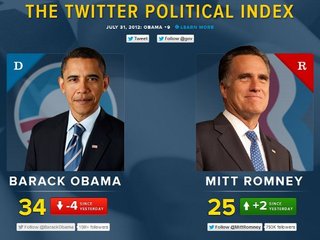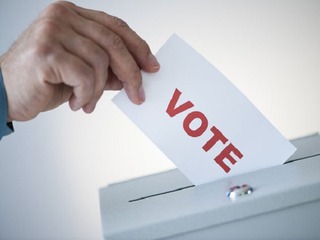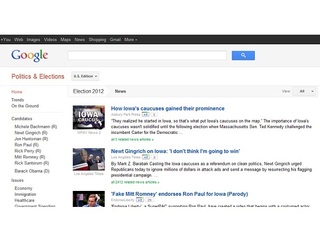The FDA outlines draft guidance on AI for medical devices
The agency also published draft guidance on the use of AI in drug development
Read more...
As anyone with a Facebook or a Twitter account knows, social media is a haven for people to spout their political views, sometimes ad nauseum.Last week’s first presidential debate between Mitt Romney and Barack Obama was the most heavily tweeted event in U.S. history, topping the RNC and the DNC with 10.3 million tweets in 90 minutes. After Mitt Romney said he would cut funding for PBS, Big Bird generated 17,000 tweets per minute.
People are obviously paying attention and that, I think we can all agree, is a good thing. But does it mean anything real? Does it translate into something tangible?
According to a study conducted by Twitter and Compete, it does. While a tweet is unlikely to change someone’s vote, it apparently will help to drive them to donate to a political campaign.
The study found that the average Twitter user is 68% more likely to visit the donation page of a campaign than that of an Internet user who is not on Twitter. When exposed to political Tweets, that number jumps all the way up to 97%. A tweet from a political handle they follow, a retweet from one of the friends, Promoted Product campaigns by a political handle, or searches on political terms are all proving to be extremely effective in driving users to political donation sites.
Just simply seeing a political tweet, though, is not enough. The study found that the longer that someone is exposed to political tweets the more likely they are to donate. Someone on Twitter who sees a political tweet for three to seven days were 31% more likely to donate than the average Twitter user. When that number went to eight or above, the number jumped to an astonishing 130% greater chance that they would donate to a political campaign.

What’s even more heartening in this day of bitterness, partisanship and division is that it doesn’t even matter which party was doing the tweeting.
“The data didn’t allow Compete to analyze the Presidential campaigns separately,” Peter Greenberger. Director of Political Ad Sales for Twitter, wrote in the blog post. :However, the lifts in donation rates by Twitter users were found to be very similar across all candidates, groups and parties. Republican handles accelerated donations to their candidates at virtually the same rate as Democratic handles did for theirs.”
It’s common knowledge that those on social media are often politically active. A report released last month by the Pew Research Center’s Internet & American Life Project found that 25% of social network users say that they have become more active in a political issue after discussing it or reading about it on a social networking site.
As a result, social media site are more than happy to give their users what they want, in order to drive up traffic on their sites.
Twitter got into the game with the Twitter Political Index, a tool gauges how often a candidate’s name is mentioned in any of the 400 million daily tweets. So if the candidate has a score of 30, that means he has been mentioned in 30% of all tweets.
Google has unveiled a number of helpful apps for voters this year.
In January, Google announced the launch of new feature Google Elections, right before the Iowa caucusesto help concerned citizens look at aggregated news, search by a variety of election-relevant criteria, such as candidate popularity or important issues, and even look at ready-made trend graphs.
Google also has a YouTube channel geared toward the 2012 election, called YouTube Politics, where voters can view quick clips of candidates's speeches and public appearances.
In August, Google released on online voter guide, which provided information about voting deadlines, how to register to vote and how to vote by mail. In September it launched the Google Civic Information API will allow developers to include information on their apps such as polling locations, early vote locations, data on candidates, and election official information, in order to make it easier for people to vote.
So social media is no stranger to the political game. What the Twitter/Compete study has now shown, though, is that politics on social media can actually be translated into a way to drive money. And that has got to be good news for Twitter, and presumably all other social media sites, who are no doubt going to attempt to use that fact as way to promote advertising for political campaigns.
”We have always known that Twitter users are politically engaged; now we know that exposure to political tweets drives political contributions,” Greenberger said. “As Election Day approaches, the most efficient way to increase your campaign’s impressions is by utilizing our suite of promoted products.”
My only fear with this news is that social media is already oversaturated with politics. Let's hope that they this latest news doesn't push it right off a cliff.
(Image source: https://www.examiner.com)
The agency also published draft guidance on the use of AI in drug development
Read more...The biggest focus areas for AI investing are healthcare and biotech
Read more...It will complete and submit forms, and integrate with state benefit systems
Read more...


